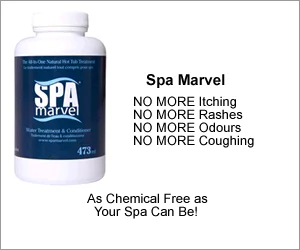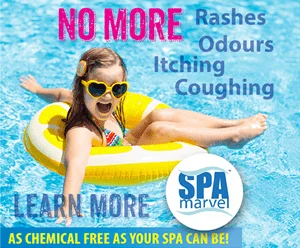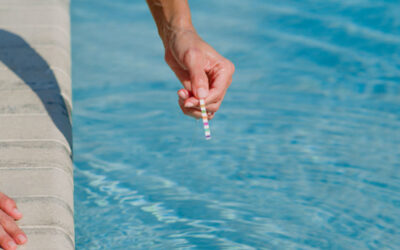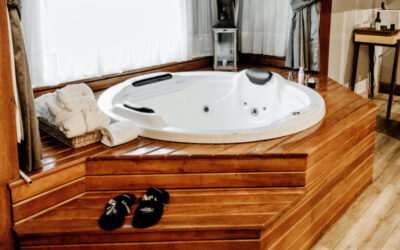Best Hot Tub Chemicals for Sensitive Skin
If your skin gets irritated by harsh hot tub chemicals, you may be tempted to abandon your spa. Fortunately, if you use the best hot tub chemicals for sensitive skin, such a drastic measure is often unnecessary. Natural solutions for your hot tub may provide a more enjoyable experience without the misery that can follow. It just boils down to finding the best hot tub chemicals for sensitive skin that work well for you.
When it comes to the maintenance of your spa, it requires treatments for your water, plumbing, shell, and filters. Organic hot tub chemicals for all of these are addressed under the following topics:
- natural spa water treatment
- natural hot tub sanitizer
- natural hot tub cleaner
But first, let’s clear up a misconception that a chemical-free spa water treatment exists. Hot tub owners, particularly those with sensitive skin, often get caught up in a fruitless search for a completely chemical-free spa water treatment. The truth is, it doesn’t exist. All hot tub water products contain or produce some chemicals. Just like chlorine and bromine are chemicals, so are other systems, products, and ingredients, including salt and minerals used in some systems. Even enzymes, often presumed to be living organisms, are complex chemicals (produced by bacteria).
In other words, while ‘natural spa water treatment’ and ‘chemical-free spa water treatment’ are commonly used interchangeably, they have two distinct meanings. The latter of which doesn’t exist and never will. That’s because everything is made up of chemicals, including you and me.
So ultimately, what you are seeking is the safest or best hot tub chemicals for sensitive skin. For some bathers, that may be a chlorine-free and bromine-free spa. Fortunately, gentler, natural solutions for the hot tub are available for use either with or without chlorine or bromine.
Natural Solutions for the Hot Tub
Hot tub water requires multiple types of products to maintain clarity, sanitizer and pH levels, and make it safe for dry and sensitive skin. So when choosing organic hot tub chemicals, aim for the best hot tub chemicals for sensitive skin among each of the various types of products.
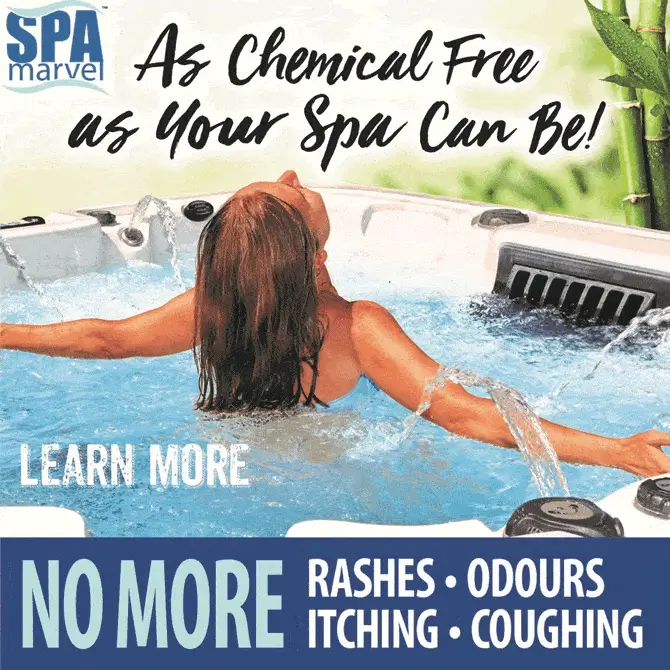
Also, consider the type of hot tub water treatment system you have to ensure the organic hot tub chemicals you’re considering are suitable for your system.
Another consideration when looking for natural solutions for your hot tub is reducing your risk of exposure while cleaning your spa. So look for a natural hot tub cleaner for both your spa’s plumbing and filters. Also, be aware of which chemicals can and cannot be used together, even if you use a natural hot tub cleaner, to avoid a dangerous chemical reaction.
Natural hot tub sanitizer
For a natural hot tub sanitizer that lacks the harshness of chlorine and bromine, or reduces how much of these chemicals are required, there are several options. Ozonators, ionizers, UV purifiers, and saltwater chlorine generators are among the possibilities. Each of these systems, however, has its pros and cons.
For example, saltwater chlorine generators require fewer harsh chemicals. Yet they do produce chlorine. Also, salt is corrosive, which can damage your equipment. Despite sometimes confusing claims, ozone, ionization, and UV ought to be used in conjunction with a registered sanitizer. A salt system does not require it because it is generating a registered sanitizer.
One of the best chemicals for sensitive skin may be biguanides. This sanitizer can provide a non-chlorine and non-bromine spa. Biguanides were developed initially as an antimicrobial scrub for surgery because of biguanides’ aggressive germ-killing capability. At the same time, biguanides are gentle on your eyes and skin. They also don’t produce the smelly chloramines associated with chlorine and bromine treated spas, which is healthier for your lungs and makes for a more pleasant bathing experience. Some of the more popular biguanides include Revacil, Baquacil, and Soft Swim.
Still, like all spa sanitizer treatments and systems, biguanides do have a few drawbacks. Biguanides cost a bit more than chlorine and bromine. They also deteriorate rubber and certain plastic parts in your spa. In addition, they don’t destroy all organic material in your hot tub. So adding hydrogen peroxide will be a routine part of your spa water maintenance. Foaming can be another problem, which requires daily foam removal to ensure proper sanitization. Often, the benefits of biguanides do not outweigh the hassle they create.
Natural spa water treatment

Sanitizers aren’t the only natural solutions for your hot tub water. Organic hot tub chemicals, such as an enzyme-based natural spa water treatment, can make your hot tub water feel as if you use a chemical-free spa water treatment. One of the best hot tub chemicals for sensitive skin is Spa Marvel Water Treatment & Conditioner. This enzyme-based natural spa water treatment provides the following benefits to bathers with sensitive skin:
- fewer harsh chemicals are required to maintain sanitizer levels
- it’s gentle on the hair
- it eliminates dry skin and hot tub rash
- it makes your skin feel soft and silky
Natural hot tub cleaner
If you have sensitive skin, taking special precautions with your hot tub water is essential. It’s also crucial to avoid skin contact with irritating cleaners while cleaning your hot tub. When choosing the best hot tub chemicals for sensitive skin, a natural hot tub cleaner is another way to protect your skin. To clean the shell of your spa, use a natural hot tub cleaner recommended by your hot tub retailer.
Protect your skin from hot tub chemicals
Using a natural hot tub sanitizer instead of, or to reduce, chlorine or bromine may be one of the best ways to protect your skin. Also, using a natural hot tub cleaner to avoid skin contact with harsh cleaning products, as previously mentioned is a good measure, too. The following are other ways to protect your skin whether you use chlorine or organic hot tub chemicals in your spa. So make these tips a part of your hot tub ritual.
- Shower before entering the spa. Wet skin and hair are less able to absorb water. So this helps keep the chlorinated water from reaching the deeper layers of your hair and skin.
- Upon exiting the hot tub, shower with soap, then rinse your body thoroughly. Also, use a sulfate-free shampoo to protect your hair.
- Treat your skin and hair with a vitamin C spray to neutralize chlorine. Just mix ½ teaspoon of sodium ascorbate with 4 ounces of distilled water. Be sure to use the spray within 24 hours, though, before this short-life solution loses its effectiveness.
- Apply deep moisturizing cream to your skin, particularly one with ceramides. These are the oils naturally found in our skin.



